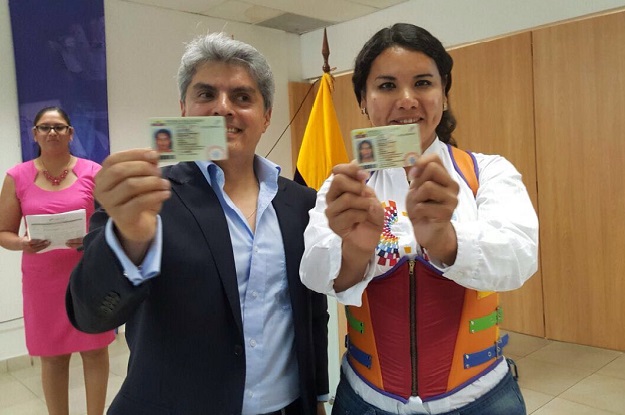Lesbian, gay, bisexual, and transgender (LGBT) advocacy groups expressed disappointment this week after comments by Pope Francis were released showing the Catholic leader’s unease over the growing social acceptance of transgender rights. During a private meeting last week, the pope said the idea of teaching schoolchildren they can choose their gender was “terrible” and that education curricula affirming trans identities amounted to “ideological colonization.”
The pope’s comments could have an effect in Latin America, where he holds considerable influence, and a fledgling transgender rights movement already faces considerable opposition. But trans people in three countries this week still have reason to celebrate, with measures being approved or going into effect that will help them be legally recognized as the gender with which they identify.
The victories are small but important steps for the transgender and gender-nonconforming people across the region who continue to face discrimination, and even death, for living their lives openly:
First, on August 1, trans Bolivians became able to change their name and sex on official documents after a gender identity law passed in May went into effect. Officials estimate that some 2,000 individuals could benefit from the law in its first six months. The first person to get a new ID was Pamela Valenzuela, who told reporters from Bolivia’s Agencia de Noticias Fides that the occasion marked a “historic day for Bolivia.”
“It’s taken years of struggle and demands (for the state) to recognize our identity,” Valenzuela said.
Though the Washington Post and others have noted that the law may have been an effort by President Evo Morales to atone for a homophobic remark he made late last year, the move is nonetheless an encouraging step toward combatting transphobia in a country with high levels of impunity for trans violence.
Just days later, on August 3, trans Ecuadoreans marked a similar milestone, when the country’s reformed Gender and Identity Law went into effect, allowing trans people to change their genders on government IDs. Speaking with AQ, Diane Rodríguez, president of the Ecuadorian Federation of LGBTI organizations and coordinator of the Trans Revolution Platform, described the policy change as “pioneering,” saying it was “a very important, historic step forward that we’ve taken in Ecuador.” Rodríguez was one of the first people to receive a new ID on Wednesday, enthusiastically displaying a new card that stated her gender as femenino, rather than masculino.
“Before, we didn’t have citizenship,” Rodríguez told AQ. “For example, if we went to the bank and the teller saw that your gender didn’t reflect what was on your ID, they would have to go to their supervisor, ask if something was wrong, and ultimately you were treated differently and you’d have to give an explanation.”
On the same day, legislators in Chile moved closer to allowing trans people to change their legal name and sex without the approval of a judge. The Senate’s Human Rights Commission approved a provision for a bill that, if passed, would let unmarried adults over the age of 18 change their names and sex through the Civil Registry. Activists praised the committee’s decision as an early but important step in creating a legal framework to support transgender people’s right to be recognized however they wish to identify.
“It’s important that the process of changing one’s legal name and sex be an administrative one and not a judicial one,” Jimena Lizama, legal director for the LGBT advocacy group Fundación Iguales, told AQ. “This is an internal and profound experience, which has nothing to do with a disease, and shouldn’t be up to the will of a judge but to the will and true feelings of a trans person,” she said. “Furthermore, this makes the process simpler and faster.”
The move in Chile and the milestones in Ecuador and Bolivia point to possible momentum for trans rights in Latin America. Similar policy changes in Uruguay, Colombia and Argentina in recent years helped get the ball rolling. There are already signs of momentum in Bolivia, where, emboldened by their recent legislative win, LGBT groups have set their sights on the passage of federal hate crime legislation.
Much more will have to be done to make life safer for transgender people in the region: a total of 1,654 trans and gender diverse people were killed in Central and South America between January 1, 2008, and April 30, 2016, according to Transgender Europe’s Trans Murder Monitoring project. But creating a legal framework to ensure transgender people’s right to live their lives openly is an important step. No matter the pope’s objections.
—
O’Boyle is an editor for AQ.









